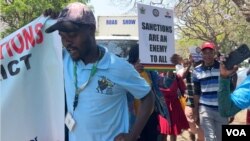Columbus Mavhunga
HARARE, ZIMBABWE — Zimbabwe’s government criticized the modification of U.S. sanctions this week that renew measures against President Emmerson Mnangagwa and some senior leaders while removing others from the list.
U.S. Embassy officials said the new sanctions aim to improve Zimbabwe’s human rights record and reduce corruption.
Zimbabwe Information Minister Jenfan Muswere on Wednesday condemned the United States and called for an immediate and unconditional removal of what he called “illegal” sanctions.
“Government of Zimbabwe would like to dismiss any suggestions that this is a new development between Harare and Washington,” he said, noting that Mnangagwa has long been under U.S. sanctions.
“To this end, the government of Zimbabwe condemns the perpetuation of the heinous sanctions against Zimbabwe and their intended effect to decimate our economy,” Muswere said. “Consequently, we do not celebrate the current delisting of other key players. ... Zimbabwe was never supposed to be under any form of sanctions from another nation in the first place.”
U.S. Embassy Chargé d’Affaires Laurence Socha on Wednesday said the Biden administration was committed to ensuring the sanctions are relevant, timely and targeting those closely connected to corruption and serious human rights abuses, including Mnangagwa.
“In Zimbabwe we continue to witness gross abuses of political, economic and human rights, Socha said. “The targeting of civil society and severe restrictions on political activity have stifled fundamental freedoms, while key actors, including government leaders, have siphoned off government resources for personal gains. U. S. sanctions are not on the country of Zimbabwe.”
Zimbabwe’s government blames sanctions for the country’s economic struggles since the early 2000s. Critics attribute the decline to corruption and bad policies by Harare.
Marvellous Kumalo, spokesperson for the rights group Crisis Coalition of Zimbabwe, said, “We have never invited sanctions or celebrated their existence. We are happy now because the Harare administration has always blamed sanctions whenever they failed to deliver in terms of social-economic goods. So now we will keep them in check and see whether they will deliver.”
He continued, “We urge Zimbabwe’s government to revise their human rights record, their public corruption, issues to do with reforms. We will be happier if they institute reforms that make Zimbabwe a better country.”
Obert Masaraure, president of Amalgamated Rural Teachers Union of Zimbabwe, said he hopes the new measures announced by Washington will do more than improve the economic picture.
“Zimbabwe keeps sliding back with respect to issues of human rights, democracy, holding credible elections,” he said. “We have also seen massive looting of our mineral wealth. All this has led to serious poverty among our people. Teachers are also affected; earning below the poverty datum line. That is why at least 4,000 are leaving the country annually to seek greener pastures.
“So, we hope that this [new] sanction regime can apply pressure on Harare so that it reforms and creates a governance architecture that carries the hopes and aspirations of our people,” he said. “That’s democracy.”
In announcing the modified sanctions, U.S. President Joe Biden also terminated the official U.S. state of emergency regarding actions and policies of the Zimbabwe government, which was first imposed in 2003 following reports of election rigging and human rights abuses.





Forum